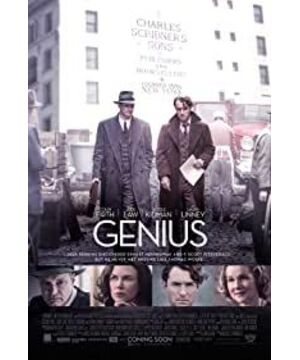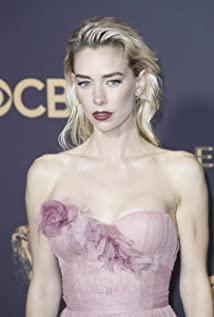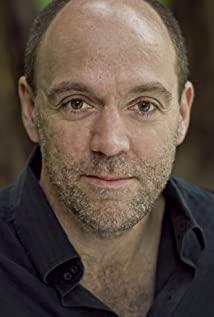To be honest, I was a little surprised that a film like "Genius Catcher" was able to be introduced, because it is really not very popular. The biopic "Fast Love", which I liked very much in the past two years, was not good at the domestic box office. Given the lack of styles and genres of domestic cinema films, we really need more such films.
As a person from a Chinese department, I am full of curiosity and expectation for the film. Although I am very interested in contemporary American literature, unfortunately I have not read Thomas Wolfe and his masterpiece "Angel, Look Hometown". The film brought me closer to this literary genius, and allowed me to build a vivid image of the writer in my mind (although the film may not be all real), which is not easy to do in reading. After reading Haruki Murakami for so many years, I can't imagine what this gentleman's words, deeds, frowns and smiles will be like. That's the beauty of movies.
The cast of the film is very strong and interesting: the two leading actors, Colin Firth and Jude Law, are British actors, the heroine Nicole Kidman and the supporting actor Guy Pearce are from Australia, Only Laura Linney is a true American. As a result, this film depicting American literary giants and book editors in the 1920s and 1930s has an inexplicable British flavor, and even New York in the film looks like a low-key and low-saturated retro lens style. London. The whole film unfolds in a dimly lit publishing house, a steam-filled train station, and editor Max Perkins' traditional American home: the first shot begins with the streets of New York in the 1920s. It is raining, Countless people in the ground came and went in the rain. And among them stood a future genius: one of the greatest contemporary American writers, Thomas Wolfe.
Thomas Wolfe is definitely a genius. In the era of economic depression in the 1920s and 1930s, he wrote words full of passion, confusion, and great personality. Even William Faulkner, who wrote The Sound and the Furious, admired it. Similar to the biographical films describing scientific and artistic genius, we will think of "A Beautiful Mind" or "Mozart". But on closer inspection, none of these films can answer a question that may be of great interest to audiences: How does genius become genius? Movies can only help us understand what kind of existence geniuses are, what their lives, dreams, fears, and desires are. "Genius Catcher" takes a slightly different perspective, describing how genius is discovered and polished to shine.
The film cuts through the story by editing the friendship between Max Perkins and Wolff, and what's interesting about this angle is that, in a way, both men are torn between the two life states of frustration and poetry. ! Colin Firth's Perkins is usually a boring man who loves his wife and five lovely daughters, but they are not the focus of his life. He doesn't go on family trips, doesn't support his wife's theatrical career, and still wants a son... His life has actually been dedicated to Fitzgerald, Hemingway, and Wolff, some later famous writers, Especially the literary world they constructed. This is a Bole who is unable to create a world, but can help you perfect a world. His dreams and desires—the future generations (his strong desire for his son is a metaphor for this dream), and his uncompromising adherence to his duties and position (heard Wolff's foreword dedicated to his new book) The indifference to myself) constitutes a very attractive personality. Colin Firth's performance is light-heavy, and the size is so mellow, it's really bland.
Wolff, on the other hand, is portrayed in the film as a man of temperament completely immersed in his own world, who can come and sway his lover who has abandoned his family for many years, and who is in deep pain. Fitzgerald, his colleague in Chinese, scolded him for no period. He could write madly at a speed of thousands of words a day, or he could reluctantly and honestly delete his hard work after Perkins persuaded him... It seems that life in frustration It is the source of his poetry, because what supports him is the ambition of writing and the desire to hand down the world, but the real world has become a temporary illusion. There is a very interesting scene: when Wolff has become famous, he returns to New York, looks at the people waiting on the street to help, and can't help but question the meaning of the book he has written, whether it is of no use to these people who can't read his books at all. worthless? It's an idea that's too young, too simple, and a little naive. And this is precisely the value of writers like Wolff: despite their arrogance or loftiness, at heart they are first a human being, and then a literary genius.
Zweig once said that great men are great because they "seek refuge in immortal causes." I really don't like the idea of Perkins and Wolff's friendship being described as a kind of friendship. In my opinion, the two of them are much more than just sympathy for each other. Two people save each other in the life of frustration and poetry, and seek immortality together in the great words. This is also at the end, when Wolff leaves, Perkins takes off his hat for the first time for the first time: the man is dead, and no one can save him and be saved by him. Those great words and once great lives are over.
I like this story theme very much, but the film is still a little far from the classics like "Mozart Biography" and "A Beautiful Mind". The biggest problem is that the storyline is based on the revision of Wolff's novel as a clue, and it lacks the moment that really penetrates into the hearts of the two protagonists. Or stifle the unique shine of the original manuscript? An opportunity that could have penetrated into the heart of the protagonist and showed his fear, confidence, hesitation, and introspection was easily passed. The same goes for the portrayal of Wolff. We found that when describing these literary geniuses, we must bring the work into his life, not life into his work—that is to say, use the story of his life to show the work and its characteristics, rather than the work as the film's material. In this regard, "The Biography of Mozart" is very clever!
Wolff, "Angel, Look Hometown", American contemporary literature, New York stories in the 1920s and 1930s... These may all be too far away from ordinary Chinese. Don't you see that the domestic "Golden Age" box office is not ideal? But the unfamiliar themes and the types that are not exciting enough should be the reason why we go to the movies. Cinema is not only an entertainment place, it is a window to experience life and the world. Great characters seek refuge in immortal causes, shouldn't we seek refuge in good movies, for a life's disappointment or poetic experience?
View more about Genius reviews











